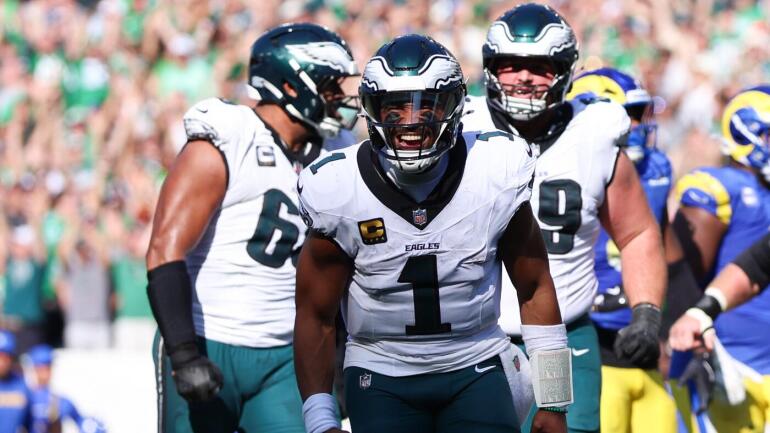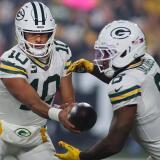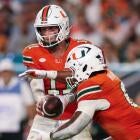Sports betting for beginners: A guide for new sports bettors
In this guide, we break down everything that a sports betting beginner needs to know before joining a sportsbook and placing their first bet

It may seem daunting to get into sports betting for beginners, as there are a ton of different types of bets to be made at all sorts of different sportsbooks. That's why we break down everything you need to know in this beginner sports betting guide, which explains the different types of bets you can make on different games and events, where you can place sports bets and much more. Start betting now at DraftKings Sportsbook:
What are sportsbook promos?
Sportsbook promos are offers from sportsbooks extended to new users to incentivize them to sign up for a sports betting account. Some sportsbooks offer new users bonus bets â essentially site credit â for signing up and placing a first bet, typically at least $5 or $10. These are called "bet-and-get" promos. Some sportsbook promos also offer bonus bets of the "first-bet insurance" variety. It's important to note that bonus bets have an expiration date, typically seven days after they're issued. These are where a user can get their stake back from their very first bet if that bet loses. Other promo types include offering profit boosts, while some even include money off of different subscription services.
These promotions give new users the ability to get something immediately upon joining a sportsbook, while the sportsbook potentially gets more users.
Money line betting for beginners
Money line betting is one of the simplest forms of betting, and it's an easy one for sports betting beginners. Simply put, betting on the money line is picking which team (or player in individual sports like golf or tennis) is going to win a game or match.
In team sports, each side will have a number attached with either a "+" or "-" in front of it. With minus odds, that number is how much a bettor would need to wager in order to get $100 in winnings. So if a team is -125, you'd need to bet $125 to win $100. If a team has plus odds, that number is how much a bettor would win with a $100 bet, so a $100 bet at +125 odds would be $125 in winnings. Minus odds are typically attached to favorites while plus odds are typically for the underdog.
Betting the money line in individual sports like golf means bettors are wagering on which player will win an event. Because there are so many players in the field, all players will typically have plus odds attached to them.
Money lines are determined by algorithms and oddsmakers who look at a number of factors like team play, player health, weather conditions, head-to-head matchup history and more. Bet money lines now at Caesars Sportsbook:
Point spread betting for beginners
Unlike money-line betting where you bet on which side will win, betting on the point spread is wagering on the margin of victory in a given game. This is another popular form of sports betting for beginners and experienced bettors alike.
In a football game, for instance, you may see that one team is -3.5 while the other is +3.5. That means the team that's -3.5 is favored by 3.5 points and is the expected victor. If you bet on a team at -3.5, you need them not just to win, but win by 4 or more points. If you bet on a team at +3.5, you need them to either win the game or to lose by 3 or fewer points. These sides of the spread, as it's called, have odds attached to it as we discussed with the money line. Backing a team at -3.5 may come with -105 odds while backing the other team to "cover" +3.5 may be -115.
Point spreads are determined by algorithms and oddsmakers who look at different factors like recent team play and health, and it's designed in part to even the playing field from a betting perspective between two teams that may not be of equal talent or skill level.
Total betting for beginners
Betting on the total is also known as betting on the over/under. Betting on the total means you are betting on how many total points, runs or goals a game will have. For example, a Chiefs vs. Raiders matchup may have a total set at 48.5 points. That means in order for an Over bet to win, the two teams would need to combine for more than 49 total points, say a 26-23 game. Conversely, an Under bet would need the two teams to score 48 or fewer points in that game, like a 27-21 finish.
The total, or over/under, is determined by different algorithms as well as factors such as injuries, recent play, recent history between the two teams and even weather. For instance, a football game with a lot of rain or snow may see a lower total set before kickoff than a game played indoors due to the potential impact poor weather conditions may have on the playing surface or the ball itself. One or both teams may be scoring a lot or very little in the leadup to a game, or maybe these two teams have played shootout-type contests or low-scoring affairs over their past couple of meetings. All those factors may influence whether a specific game has a total higher or lower than other games across the league.
With an over/under bet, each side of the bet has odds attached to it in money line form. Oftentimes, these lines are very close to one another, or they may even be the same at -110. Going back to that Chiefs vs. Raiders example where the total is 48.5, the Over side may be -105 and the Under is -115. That means sportsbooks slightly lean towards the game finishing with 48 or fewer combined points. Bet point spreads at Bet365 Sportsbook:
Futures betting for beginners
Bettors can place more bets than just on a single game's victor, spread or total. A very popular form of betting is futures betting. These are long-term bets, typically season-long wagers, on different outcomes. These outcomes include the league's champion that year or divisional winners, as well as individual awards and outcomes like MVP, rookie of the year or stat leaders. Some bettors also like to place futures bets on whether a player will go Over or Under a certain line for a particular statistic, or if a team will make or miss the playoffs or go Over or Under a designated win total.
Like money-line bets, spread bets and total wagers, futures bets use money-line odds with a "+" or "-" in front, designating how much a bettor would win with a $100 wager or how much a bettor must wager to win $100, respectively.
Many bettors place futures wagers in the offseason leading up to the first regular-season games of the year. Part of that is simply the long layoff between the previous season's championship game and the first game of the following season, but also because that's when odds are the longest for most futures bets.
Take betting on the NFL MVP, for instance. Because there are so many star players across the league and we're not certain how they will play or who will stay healthy, players will have longer odds in the summer months than when the season starts, as we'll have more data and some players may be injured or even benched, thus torpedoing their MVP candidacies and odds. The later in the season you get, the clearer it is who the favorites are for awards or championships, thus you will see shorter odds for the favorites and much longer odds for players or teams who have next to no shot of winning an award, championship, division, etc.
Prop betting for beginners
Another popular form of sports betting is prop bets, which is betting on a particular outcome within a game. Rather than betting on a game's victor, total or the spread/margin of victory, prop bets are typically "yes or no" or "over/under" wagers for different outcomes, typically related to statistics.
Player props
Many props center around player performance, such as the amount of passing yards, points scored or total bases a player may have in a game depending on the sport. For instance, you may bet on Patrick Mahomes' passing yardage prop for a certain game where it's set at 245.5. If you bet the Over, Mahomes needs to pass for 246 or more yards for your bet to cash. If you bet the Under, he needs to have 245 or fewer passing yards in that game.
Team props
There are also team-based props, such as total touchdowns or 3-pointers made a team will have in a single game. Additionally, those same types of props can be available for the game as a whole, so you can bet on how many combined touchdowns, 3-pointers scored, goals scored or home runs hit that a single game will have. You can also bet yes/no props like if a game will go to overtime or extra innings, among others.
Props are determined first by which players will be playing in a game. Most sports have the same available props across the league's games, but the players, lines and odds shift depending on the players and games themselves. The pricing for props works the same as money line, spread or total betting. Each side of a prop has odds attached to it in the form of plus or minus odds, and you wager on which side you think will be correct. The prices of each prop as well as the lines themselves are created by oddsmakers who are examining matchups, how a player has done recently, the weather and much more. These are typically derived from the same game projections that oddsmakers use to create odds for the money line, total and spread.
Bet props at BetMGM Sportsbook:
Parlay betting for beginners
Parlays are where bettors combine multiple wagers into one slip. In order to win, you need all bets in the parlay, referred to as "legs," to be correct. Since you need multiple outcomes to be correct, the odds for parlays are longer than placing singular straight bets on their own due to the decrease in implied probability with each leg added. Parlays are popular for bettors who, rather than wagering more money on one or two outcomes, prefer to place a few bucks on a parlay to get a potentially big return should all their predictions come true.
Parlays are different from straight bets like money line, point spreads and over/under totals because they involve multiple bets. Those types of bets, though, are often what make up a parlay. For example, on an NFL Sunday, you may craft a three-leg parlay of the Seahawks on the money line against the Rams, the Steelers to cover at +2.5 against the Bengals and the Ravens-Browns matchup to go Over 49.5 points. If you were to bet on all three of these outcomes on their own and win, you'd still get a nice return in winnings. But if you combined all three into a single parlay and all three legs hit, the odds would be much longer, thus you'd receive more in winnings.
Parlays can also include player, team or game props. Some bettors like to combine bets from different sports into one parlay, some like to do one sport but with bets across multiple games, and others prefer "same-game parlays," which is betting on multiple outcomes in the same game on the same bet slip.
Responsible gaming for beginners
Bettors of all experience levels should always practice responsible gaming. Sportsbooks offer tools and resources like time and wager limits, as well as voluntary self-exclusion measures and timeouts. Bettors should have a designated bankroll total, meaning a hard cap on how much they are willing to bet and potentially lose in a given bet or day. It's critical for bettors to adhere to their bankroll and to not chase losses. That means if you lose $100 on a bet, don't place another bet with the sole purpose of trying to win that $100 back in order to break even, especially if it means going over your designated bankroll limit. Betting within your means is an incredibly important part of responsible gambling.
There are local and national resources available to all bettors, and sportsbooks will have numbers, emails and websites available for that. Bettors can contact the National Council on Problem Gambling at 1-800-522-4700, or check out Gamblers Anonymous.
Where can you bet on sports online legally?
Sportsbook betting is legal in some capacity in 39 states and Washington D.C. across the United States. Only California, Alaska, Hawaii, Utah, Texas, Oklahoma, Minnesota, Georgia, South Carolina, Alabama and Missouri do not have some form of legal sports betting available, though Missouri will start allowing sports betting beginning in December.
Some states allow retail sports betting in-person at casinos but not online, such as Washington state and New Mexico. Online sports betting is currently available in 33 states across the U.S: Arizona, Arkansas, Colorado, Connecticut, Delaware, Florida, Illinois, Indiana, Iowa, Kansas, Kentucky, Louisiana, Maine, Maryland, Massachusetts, Michigan, Mississippi, Montana, Nevada, New Hampshire, New Jersey, New York, North Carolina, Ohio, Oregon, Pennsylvania, Rhode Island, Tennessee, Vermont Virginia, Washington D.C., West Virginia and Wyoming. Missouri will join that list in December.
Another popular gaming format for sports fans are Daily Fantasy Sports, or DFS, apps. These are legal in most states, but there are different restrictions in place. Some states allow DFS to operate but with restrictions to the types of formats and games bettors can play. Additionally, states like Alabama, Alaska, California, Georgia, Nebraska, North Carolina, North Dakota, Oklahoma, South Carolina, South Dakota and Texas don't allow sportsbooks to operate in the state, but DFS platforms are legal for residents to play.
Much like sportsbooks, DFS apps differ from state to state. For instance, Alaska allows Betr to operate in the state, but Alabama doesn't. So if you're interested in DFS, make sure it's available in your state, and if it is, check out which platforms are available, such as Underdog, DraftKings Pick6, FanDuel Picks and ParlayPlay.
Five things to remember for beginners in sports betting
Here are five things new bettors should know and always remember if they want to start sports betting.
1: Always game responsibly
Do not chase losses and stick to your allotted bankroll. If you feel like you need help, find out which local and national resources are available.
2: Understand odds
If you're not yet clear on what plus and minus odds mean, you're not going to understand what you're betting on or how much winnings you may get if your wager wins. Learn how odds work before placing any bets.
3: Utilize sportsbook promotions
If you're a new bettor, sportsbooks want to get you in the door, and they offer different promotions to assist new bettors with getting started. Some may give you bonus bets or profit boosts after placing a small first wager and some may offer bet insurance, returning bonus bets if your first bet loses. Use these to your advantage to see which sportsbooks you like and don't like, and to get more bang for your buck when you're starting out.
4: Shop around for odds
The favorites and underdogs for each side of a bet may largely be the same across all sportsbooks, but the odds may be different. Use this to your advantage by comparing odds at all available sportsbooks before you place a bet. This will allow you to maximize your winnings by getting the best odds possible.
5: Do your research
Whether it's for betting on a game or picking a sportsbook to sign up with and place a wager at, make sure you are doing your research beforehand. Placing wagers on a sportsbook app is fast and easy, which means it can be easy to place a bet or bet with little to no thought at all. Make sure you feel strongly and comfortable about your picks after researching the teams and players, and stay up to date on injury reports, weather forecasts and other potential impacting factors.
FAQ
How to do sports betting for beginners?
Those looking to get into sports betting for the first time should find out which sportsbooks are available where they live and sign up and make an account. If you are placing wagers online, you will need to deposit money into your account before placing a bet. Users place bets by finding the game or event they want to bet on and choosing the specific type of bet they want to make.
What does +/- mean in betting odds?
When one side of a bet has plus odds, that shows the amount of money a bettor would get for wagering $100 and winning that bet. With minus odds, that shows how much a bettor would need to wager in order to get $100 in winnings. In team sports, plus odds are typically attached to underdogs while minus odds are attached to the favorites.
















